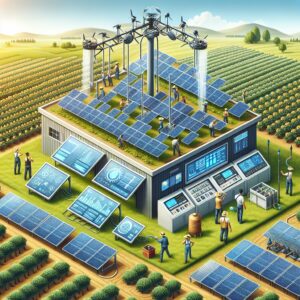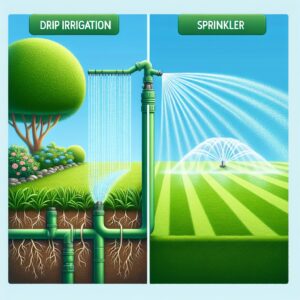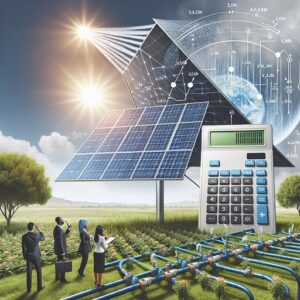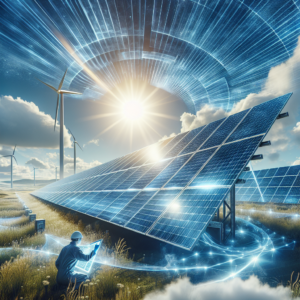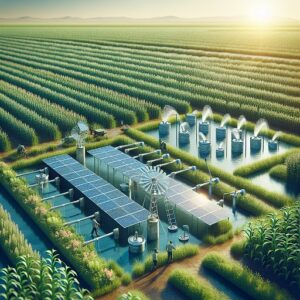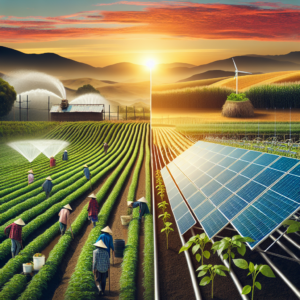
Imagine walking through your fields, the sun beating down not just on your crops, but also on the sleek solar panels powering your irrigation system. This isn’t a distant dream—it’s a practical solution that’s within your reach. By harnessing the power of the sun, you can water your crops efficiently, save on energy costs, and contribute to a healthier planet.
But before you jump in, let’s get a clear view of what’s ahead. I’ll guide you through the ins and outs of selecting the best solar panels for your agricultural needs, ensuring that you’re equipped with the knowledge to make informed decisions. This isn’t just about buying solar panels; it’s about investing in the future of your farm.

Solar Panels for Irrigation Systems: An Energy Solution for Agriculture
Switching to solar power for your irrigation needs isn’t just about being eco-friendly; it’s a strategic move for the longevity of your farm. With the right setup, solar panels can provide a reliable water supply for your crops, come rain or shine. And the best part? Once you’ve made the initial investment, the energy you use is completely free.
So, let’s dive into the world of solar panels and discover how they can transform your agricultural irrigation system into a model of efficiency and sustainability.
Firstly, it’s essential to understand that not all solar panels are created equal. The market is flooded with options, and each comes with its own set of specifications and capabilities. Your mission is to find the panels that best suit your farm’s unique irrigation needs.
Key Takeaways: Article-at-a-Glance
Before we get into the nitty-gritty, here’s what you need to know at a glance:
-
Choosing the right solar panels is crucial for efficient agricultural irrigation.
-
Consider factors such as panel efficiency, durability, and compatibility with your current system.
-
Technological advancements are making solar irrigation more effective and accessible.
-
Economic analysis shows solar power can be a cost-effective solution in the long run.
-
Real-world success stories illustrate the benefits of solar-powered irrigation systems.
Top Factors to Consider When Choosing Solar Panels for Irrigation
When selecting solar panels for your irrigation system, keep these top factors in mind:
-
Panel Efficiency: How well does the panel convert sunlight into electricity? Higher efficiency means fewer panels are needed to meet your energy requirements.
-
Durability: Can the panels withstand the rigors of your farm’s environment, including extreme weather conditions?
-
Compatibility: Will the solar panels integrate smoothly with your existing irrigation infrastructure?
-
Cost: What is the initial investment, and how does it compare to potential savings over time?
-
Maintenance: What level of upkeep will the panels require, and how will that impact your overall workload?
Remember, the goal is to find a balance between performance and cost-effectiveness. The perfect panel for your neighbor’s farm might not be the best choice for yours. It’s all about tailoring the solution to fit your specific situation.
How Irrigation Needs Influence Solar Panel Selection
Your farm’s irrigation needs will directly impact the type of solar panel you should choose. Here’s how:
-
If your farm requires high volumes of water, you’ll need a more robust system with higher-capacity panels.
-
For farms with smaller irrigation needs, a less intensive setup may suffice, allowing you to save on costs.
-
The layout of your land and the amount of direct sunlight it receives will also play a role in determining the best panel placement and type.
Essentially, the more you understand your farm’s watering needs, the better equipped you’ll be to select the ideal solar panel system. It’s a puzzle, but one that you’re fully capable of solving with the right information.
And remember, the sun doesn’t send a bill. Every drop of water pumped by solar power is one less expense chipping away at your bottom line. It’s a win-win for your wallet and the environment.

Criteria for a Functional Solar-Powered Irrigation System
To ensure your solar-powered irrigation system is functional and efficient, it must meet certain criteria:
-
Reliability: The system should provide a consistent water supply, even on cloudy days.
-
Scalability: It should be capable of expanding to meet growing irrigation demands.
-
Usability: The system needs to be user-friendly, allowing for easy operation and monitoring.
These criteria are non-negotiable. A system that falls short in any of these areas can lead to headaches and lost productivity, which is the last thing any farmer needs.
So, let’s move forward with confidence, knowing that you’re on the path to creating a solar-powered irrigation system that not only meets but exceeds these criteria. Together, we’ll ensure that your farm thrives in the sun’s generous glow.
Solar Panel Durability in Various Agricultural Environments
Durability is the backbone of any agricultural equipment, and solar panels are no exception. They must withstand the elements—rain, hail, intense heat, and sometimes even the weight of snow. When choosing panels, look for ones with a strong track record of weather resistance and longevity. They should be built to last, with warranties that back up their durability claims.
-
Check for certifications that guarantee panels can endure high wind and snow loads.
-
Opt for panels with anti-corrosive frames, especially if your farm is near the ocean or in an area with high humidity.
-
Consider the panel’s temperature coefficient, which indicates how well it performs in extreme heat.
It’s not just about surviving the seasons; it’s about thriving throughout them. Your solar panels should be as resilient as you are, come rain or shine.
Compatibility with Existing Irrigation Infrastructure
Integrating solar panels with your existing irrigation system should be seamless. The last thing you want is to overhaul your entire setup. Compatibility is key. Look for solar solutions that can easily connect with your current pumps and controllers. This might involve selecting inverters that match the voltage and phase of your existing equipment or opting for modular panel systems that can be scaled to fit your needs.
-
Ensure the solar system’s output matches your irrigation pump’s specifications.
-
Seek out plug-and-play solar solutions designed for easy integration with agricultural equipment.
-
Consider the technical support offered by the solar panel provider for installation and integration.
Your solar panels should be like a new member of the team, fitting in right away and getting to work without causing a fuss.

Technological Advancements in Solar Irrigation
Technology never stands still, and solar irrigation is riding the wave of innovation. Advancements are making systems more efficient, cost-effective, and smarter than ever before. Let’s explore some of the cutting-edge developments that are changing the game for farmers around the world.
Innovations in Photovoltaic Panel Design
The design of photovoltaic (PV) panels is constantly evolving. Manufacturers are pushing the limits to create panels that are not only more efficient but also lighter and more adaptable to different environments. Bifacial panels, for instance, can capture sunlight from both sides, increasing their energy production without requiring more space.
-
Thin-film solar panels are becoming more popular due to their flexibility and ease of installation.
-
Perovskite solar cells, a new technology, promise higher efficiency rates at a lower manufacturing cost.
-
Look out for panels with improved anti-reflective coatings that capture more light and turn it into energy.
With these innovations, your solar panels can do more with less, maximizing the energy you harvest from every ray of sunshine.
Smart Systems: Integration of IoT in Solar-Powered Irrigation
The Internet of Things (IoT) is revolutionizing solar-powered irrigation. Smart systems allow for real-time monitoring and control of your irrigation setup from anywhere. Sensors can track soil moisture, weather conditions, and water usage, adjusting the irrigation schedule for optimal efficiency.
-
IoT-enabled solar panels can report on their performance, alerting you to any issues immediately.
-
Automated controllers can adjust water flow based on data from weather forecasts and soil sensors.
-
Remote management apps put control of your irrigation system right in your pocket.
Smart systems mean you’re always in the loop, making data-driven decisions that save water and energy while boosting crop yields.
Advancements in Energy Storage for Solar Irrigation
Energy storage is the final piece of the puzzle for a truly independent solar irrigation system. The latest batteries store excess energy generated during the day for use at night or on cloudy days, ensuring a continuous power supply. Innovations in battery technology are making storage more affordable and efficient, with options like lithium-ion and flow batteries leading the way.
-
Consider the lifespan and capacity of different battery types to find the best fit for your system’s needs.
-
Look for modular storage solutions that can grow with your farm.
-
Choose batteries with management systems that protect against overcharging and deep discharging, prolonging their life.
With these advancements, you can rest easy knowing that your crops will receive the water they need, when they need it, day or night.

Economic Analysis of Solar Installations for Irrigation
When it comes to the economics of solar installations for irrigation, the numbers tell a compelling story. While the initial investment might seem daunting, the long-term savings and potential for increased profits are too significant to ignore. Let’s break down the financial aspects to give you a clear picture of what solar power could mean for your farm’s bottom line.
Long-term Cost-Benefit Analysis of Solar vs. Traditional Irrigation
Traditional irrigation systems, often powered by diesel or electric pumps, come with recurring fuel and utility costs. Solar irrigation, on the other hand, requires an upfront investment for the panels and installation, but the ongoing operating costs are minimal. Here’s what you need to consider:
-
The price of solar panels has dropped significantly over the past decade, making solar irrigation more accessible than ever.
-
By reducing or eliminating fuel and electricity bills, solar panels can pay for themselves over time through cost savings.
-
After the break-even point, the cost savings go directly into your pocket, increasing your profit margins.
-
Maintenance costs for solar panels are relatively low, adding to the long-term economic benefits.
When you crunch the numbers, the cost-benefit analysis often tips in favor of solar power, especially when you factor in the rising costs of traditional energy sources.
Government Incentives and Subsidies for Green Agriculture
Many governments worldwide are offering incentives and subsidies to encourage farmers to adopt green technologies like solar irrigation. These can significantly reduce the initial investment and accelerate the break-even point. Here’s what to look for:
-
Grants or rebates that cover a portion of the solar panel and installation costs.
-
Tax credits or deductions for investing in renewable energy systems.
-
Low-interest loans or loan guarantees to make financing the transition more manageable.
-
Technical assistance programs to help you design and install the most efficient system.
These incentives not only make solar irrigation systems more affordable but also demonstrate a commitment to sustainable farming practices that can be good for your farm’s public image.
Initial Investment and Break-Even Point for Farmers
The initial investment for solar panels includes the cost of the panels, inverters, batteries (if needed), and installation. While this can be substantial, it’s important to calculate the break-even point—the moment when the savings from your solar system equal the initial outlay. Here’s how:
-
Estimate your current annual irrigation energy costs and compare them with the projected annual energy production from solar panels.
-
Factor in any government incentives or subsidies that will reduce the upfront cost.
-
Consider the expected lifespan of your solar panels, typically around 25-30 years, when calculating long-term savings.
With these figures in hand, you can determine how many years it will take for your solar irrigation system to pay for itself. After that, it’s all savings and increased profits.
Case Studies: Success Stories of Solar Irrigation Systems
Real-world success stories provide the most compelling evidence of solar irrigation’s benefits. Let’s look at a few case studies that showcase the impact of solar power on yield and crop health.
Impact on Yield and Crop Health with Solar Irrigation
In regions where water scarcity is a major concern, solar irrigation has proven to be a game-changer. For example, farmers in arid areas have seen their yields increase significantly after switching to solar-powered drip irrigation systems. These systems deliver water directly to the plant roots, reducing water waste and ensuring that crops receive a consistent supply of moisture.
-
One study showed a 30% increase in crop yields for farmers using solar-powered irrigation.
-
Farmers report healthier plants due to the consistent and precise delivery of water.
-
Reduced water usage not only saves money but also conserves a precious resource, contributing to the sustainability of the farm.
These stories highlight the transformative power of solar irrigation. By providing a reliable water supply, solar panels help farmers overcome the challenges of water scarcity and unpredictable weather patterns, leading to healthier crops and improved yields.
First-Hand Experience: Farmers’ Testimonials
Take the case of a farmer in California who installed solar panels to power his irrigation system. He was facing rising electricity costs and water shortages that threatened the viability of his farm. After switching to solar, he not only reduced his energy bills but also increased his almond yield by 20%. The farmer’s story is a testament to the tangible benefits that solar irrigation can bring to the table.
-
Personal accounts from farmers often mention the peace of mind that comes with having a solar irrigation system, knowing that their crops will receive water even during power outages or fuel shortages.
-
Many farmers express satisfaction with the low maintenance requirements of solar panels, which allow them to focus more on farming and less on equipment upkeep.
-
The positive environmental impact of using renewable energy is another common highlight in farmers’ testimonials.
These testimonials paint a vivid picture of the advantages that solar irrigation systems offer. They’re not just about saving money; they’re about securing a sustainable and prosperous future for farms everywhere.
First-Hand Experience: Farmers’ Testimonials
Let’s listen to what John, a farmer from Texas, has to say about his experience: “Since I’ve installed solar panels for my irrigation system, I’ve seen a noticeable decrease in my energy bills. More importantly, my crops are thriving because they’re getting a consistent water supply, even during the hottest parts of the day when we used to have restrictions on electricity use.”
-
Stories like John’s are becoming increasingly common as more farmers turn to solar power for irrigation.
-
Testimonials often highlight not just the financial savings but also the positive environmental impact and the reliability of solar power.
-
Farmers appreciate the autonomy solar panels provide, freeing them from the volatility of energy prices.
These real-life experiences underscore the value of solar irrigation systems in providing a sustainable and cost-effective solution for agricultural water management.

Installation and Maintenance Guide for Solar Irrigation Panels
Installing and maintaining solar panels for your irrigation system doesn’t have to be daunting. With the right guidance, you can ensure your solar setup runs smoothly for years to come.
Step-by-Step Installation Process for Solar Panels in Irrigation
Here’s a simplified guide to get your solar panels up and running:
-
Site Assessment: Determine the best location for your panels, considering sunlight exposure and proximity to the irrigation system.
-
System Design: Based on your energy needs, design a system with the appropriate number of panels and the right hardware.
-
Permitting: Obtain any necessary permits from local authorities before beginning installation.
-
Installation: Mount the panels, install the inverter, connect the batteries (if using storage), and integrate the system with your irrigation infrastructure.
-
Testing: Once installed, test the system to ensure it’s functioning correctly and efficiently.
For best results, consider hiring a professional installer who has experience with agricultural solar systems. They can navigate the technical aspects and ensure your system is optimized for your specific needs.
Solar Panel Maintenance and Troubleshooting
Maintenance is key to the longevity of your solar panels. Here’s how to keep them in top shape:
-
Regularly clean the panels to remove dust, dirt, and debris that can block sunlight and reduce efficiency.
-
Inspect the panels and mounting hardware for signs of wear and tear, especially after extreme weather events.
-
Monitor the system’s energy output to identify any potential issues early on.
-
Have a professional conduct an annual check-up to ensure all components are functioning correctly.
If you encounter problems, most issues can be resolved by checking the connections and ensuring the panels are clean. For more complex issues, consult with a professional who can provide expert troubleshooting and repair services.
Frequently Asked Questions (FAQ)
Can Solar Panels Provide Enough Power for Large-Scale Irrigation?
Absolutely! With the right system design, solar panels can generate sufficient power for large-scale irrigation. The key is to ensure that the system is appropriately sized for your farm’s energy needs. Large-scale operations may require more panels or higher efficiency models, but the technology is certainly up to the task.
Here are a few points to consider:
-
Solar panel systems are scalable, meaning they can be expanded to meet increased energy demands.
-
Advancements in solar technology have led to more efficient panels that can produce more power in a smaller footprint.
-
Battery storage systems can store excess energy for use during peak irrigation times or on cloudy days.
Large farms around the world are already using solar panels to power their irrigation systems effectively. With proper planning and design, solar power can meet the demands of even the most extensive agricultural operations.
What is the Life Expectancy of Solar Panels Used in Irrigation Systems?
When you invest in solar panels for your irrigation system, you’re investing in the long haul. Typically, solar panels come with a lifespan of 25 to 30 years. However, this doesn’t mean they stop working after three decades; it simply means their efficiency might decrease slightly over time. With proper maintenance, your panels could continue to power your irrigation system well beyond their expected lifespan.
Here are some specifics:
-
Most manufacturers guarantee that after 25 years, solar panels will still produce at least 80% of their original output.
-
Advancements in materials and construction are continually extending the life expectancy of solar panels.
-
Choosing high-quality panels from reputable manufacturers can result in a longer lifespan and better performance over time.
Remember, the longevity of your solar panels also depends on the conditions they’re exposed to and how well they’re cared for. With the right choice and care, your solar panels can be a lasting solution for your irrigation needs.
How Do Weather Conditions Affect Solar-Powered Irrigation Systems?
Weather plays a significant role in the performance of solar-powered irrigation systems. While solar panels are designed to withstand a variety of conditions, extreme weather can impact their efficiency and durability.

